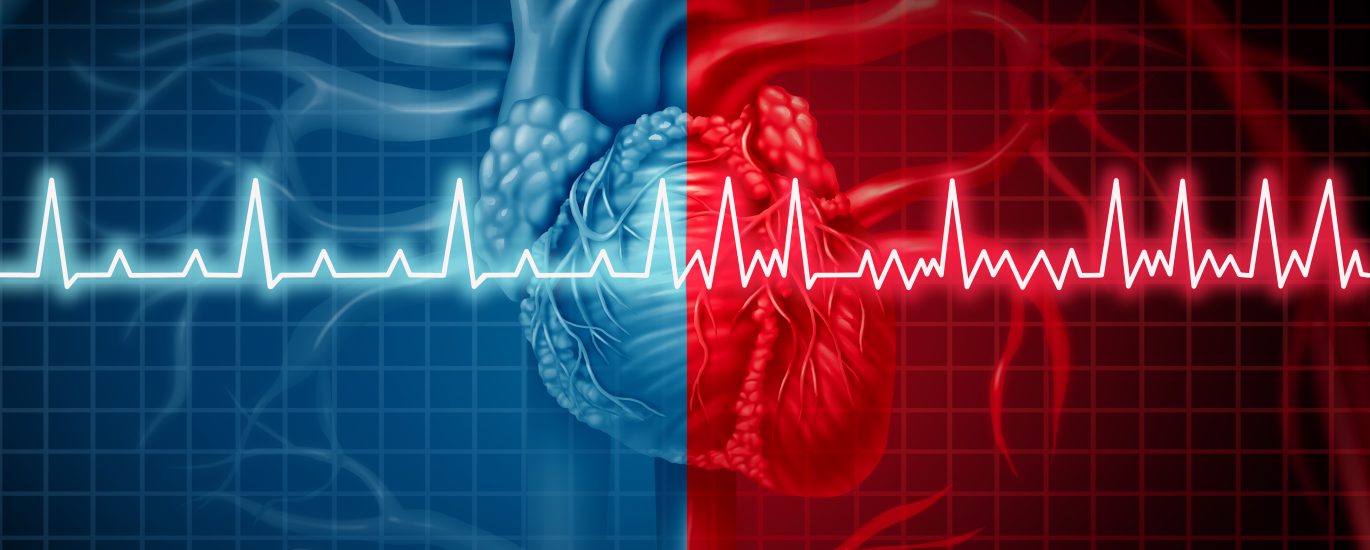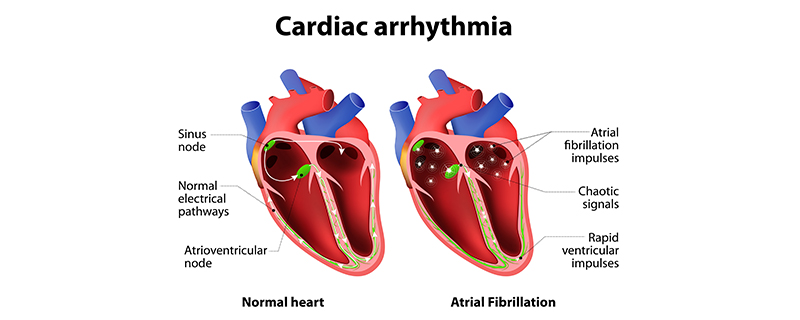Arrhythmia is a medical term used to describe an irregular heartbeat or abnormal heart rhythm. The heart normally beats in a regular pattern, but in cases of arrhythmia, the heart beats too fast, too slowly, or irregularly. Arrhythmias can affect the heart’s ability to pump blood effectively, which can lead to symptoms such as chest pain, shortness of breath, and fainting.
Types of Arrhythmia
There are many types of arrhythmia, which are classified based on the part of the heart that is affected and the pattern of the abnormal heartbeat. Here are some of the most common types:
- Atrial fibrillation: This is the most common type of arrhythmia and occurs when the heart’s upper chambers (atria) beat irregularly.
- Ventricular fibrillation: This is a life-threatening arrhythmia that occurs when the heart’s lower chambers (ventricles) beat rapidly and irregularly.
- Bradycardia: This is a slow heart rate, typically less than 60 beats per minute.
- Tachycardia: This is a fast heart rate, typically more than 100 beats per minute.
- Supraventricular tachycardia: This is a fast heart rate that originates in the upper part of the heart, above the ventricles.
- Ventricular tachycardia (VT): This is a fast heart rate that originates in the ventricles.
- Premature ventricular contractions (PVCs): These are extra heartbeats that occur in the ventricles.
- Sick sinus syndrome: This is a condition where the sinus node, which is the heart’s natural pacemaker, does not function properly.
- Long QT syndrome: This is a genetic disorder that affects the heart’s electrical system and can cause a life-threatening arrhythmia called torsades de pointes.
Symptoms of Arrhythmia
The symptoms of arrhythmia can vary depending on the type and severity of the condition. Some people may not experience any symptoms, while others may experience:
- Palpitations or a feeling of fluttering in the chest
- Rapid heartbeat
- Slow heartbeat
- Chest pain or discomfort
- Shortness of breath
- Dizziness or lightheadedness
- Fainting or near fainting
- Fatigue
- Sweating
- Weakness
In some cases, arrhythmia can cause no symptoms at all and may only be detected during a routine medical exam. Some types of arrhythmia can be serious and require immediate medical attention.
Causes of Arrhythmia
In some cases, arrhythmia may have no known cause. Additionally, some people may have a genetic predisposition to certain types of arrhythmia. It is important to identify the underlying cause of arrhythmia in order to determine the best treatment approach. Your doctor may recommend various tests, such as an electrocardiogram (ECG), Holter monitor, echocardiogram, or blood tests, to help determine the cause of your arrhythmia. There are many potential causes of arrhythmia. Some common causes include:
- Coronary artery disease or heart attack
- High blood pressure
- Heart failure
- Valvular heart disease
- Congenital heart disease
- Thyroid disorders
- Diabetes
- Sleep apnea
- Lung disease
- Electrolyte imbalances, such as low potassium or magnesium levels
- Medications or recreational drug use
- Excessive alcohol consumption
- Stress or anxiety
- Aging
Diagnosis
The diagnosis of arrhythmia usually involves a combination of a physical examination, medical history, and diagnostic tests. Here are some of the most common diagnostic tests used to diagnose arrhythmia:
- Electrocardiogram (ECG): This is a non-invasive test that records the electrical activity of the heart and can detect abnormal rhythms.
- Holter monitor: This is a portable ECG device that records the heart’s activity over a period of 24-48 hours.
- Event monitor: This is a portable ECG device that is worn for several weeks or months and is used to capture irregular heartbeats when they occur.
- Echocardiogram: This is an ultrasound test that uses sound waves to produce images of the heart and can help detect structural abnormalities that may be causing arrhythmia.
- Stress test: This is a test that measures the heart’s response to physical activity and can help detect arrhythmias that may only occur during exercise.
- Electrophysiology study: This is an invasive test that involves threading catheters through blood vessels into the heart to map the heart’s electrical activity and identify the location of the arrhythmia.
- Blood tests: These tests can help detect underlying medical conditions that may be causing arrhythmia, such as electrolyte imbalances or thyroid disorders.
Treatment
The treatment for arrhythmia depends on the type and severity of the condition, as well as the underlying cause. Here are some common treatments for arrhythmia:
- Medications: Medications can be used to control the heart rate and rhythm in some types of arrhythmia. These may include beta-blockers, calcium channel blockers, antiarrhythmic drugs, and blood thinners to reduce the risk of blood clots.
- Cardioversion: This is a procedure that involves delivering a controlled electric shock to the heart to restore normal rhythm.
- Ablation: This is an invasive procedure that uses catheters to destroy small areas of heart tissue that are causing abnormal electrical signals.
- Implantable devices: Pacemakers and defibrillators can be implanted under the skin to help regulate the heart’s rhythm and prevent dangerous arrhythmias.
- Lifestyle changes: Changes to diet and exercise habits, reducing alcohol and caffeine consumption, and managing stress can help control arrhythmia in some cases.
- Surgery: In some cases, surgery may be necessary to correct structural problems in the heart that are causing arrhythmia.
The treatment approach for arrhythmia will vary depending on the individual and the underlying cause of the condition. Your doctor will work with you to develop a personalized treatment plan that is tailored to your specific needs.
Lifestyle Factors
Lifestyle changes can play an important role in managing arrhythmia, especially in cases where the condition is mild or is related to lifestyle factors. Here are some lifestyle changes that may helpful:
- Maintain a healthy weight: Being overweight or obese can increase the risk of arrhythmia, so it’s important to maintain a healthy weight through a balanced diet and regular exercise.
- Exercise regularly: Regular exercise can help improve cardiovascular health and may reduce the risk of arrhythmia. However, it’s important to check with your doctor before starting a new exercise program.
- Quit smoking: Smoking can increase the risk of arrhythmia and other heart-related conditions, so quitting smoking is an important step in managing arrhythmia.
- Limit alcohol and caffeine consumption: Excessive alcohol and caffeine consumption can trigger arrhythmia in some people, so it’s important to limit consumption of these substances.
- Manage stress: Stress and anxiety can trigger arrhythmia in some people, so it’s important to find healthy ways to manage stress, such as through meditation, yoga, or other relaxation techniques.
- Get enough sleep: Sleep plays an important role in cardiovascular health, so it‘s important to get enough sleep each night.
In some cases, lifestyle changes alone may not be sufficient to control arrhythmia, and medical treatment may be necessary. It’s important to work closely with your doctor to determine the best treatment plan for your individual needs.
Related



